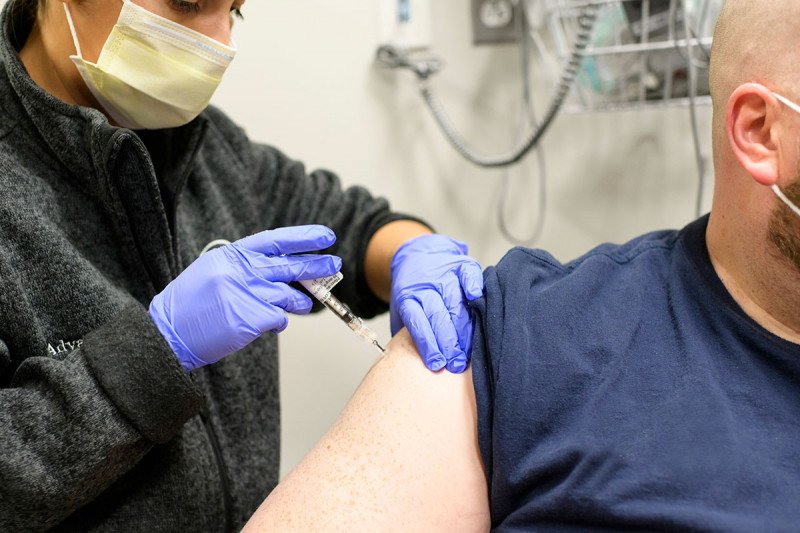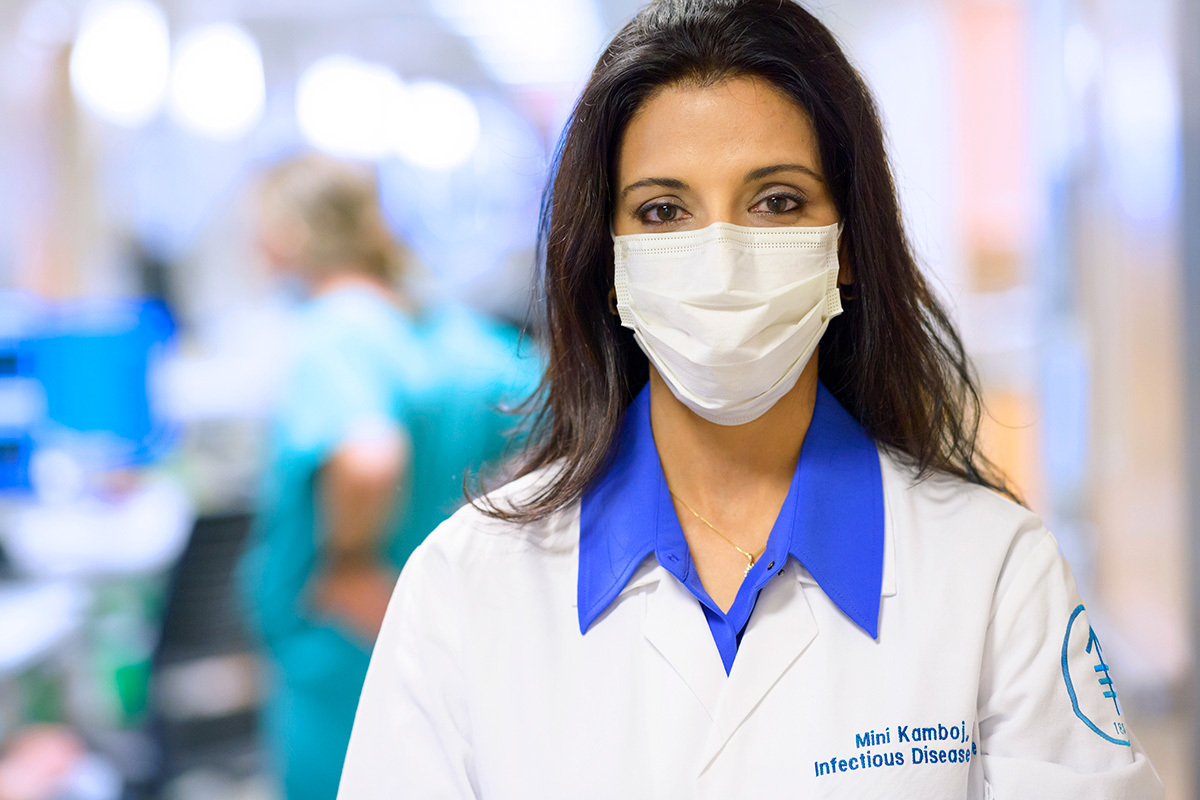
The COVID-19 vaccines are safe for people with cancer. If you have questions, contact your MSK doctor.
The Centers for Disease Control and Prevention (CDC) recommends that people with weakened immune conditions, such as cancer, get vaccinated against COVID-19. To protect our patients from COVID-19, MSK requires that all employees be vaccinated against COVID-19.
Our Chief Medical Epidemiologist Mini Kamboj answers questions you may have about the COVID-19 vaccine and cancer.
Is the vaccine safe for people in active treatment for their cancer?

Mini Kamboj
Yes. We strongly recommend that our patients with cancer get the COVID-19 vaccine. Some cancer treatments like chemotherapy or radiation can reduce how well a person’s immune system responds. It’s possible that the COVID-19 vaccines may not be as effective in those patients. Even so, some protection is better than none.
What about cancer patients with severely weakened immune systems?
You should discuss the timing of getting a COVID-19 vaccine, as well as the risks and benefits, with your MSK care team.
The COVID-19 vaccines are safe for patients with severely weakened immune systems, for example, as the result of a stem cell transplant. But these vaccines may not work as well during certain phases of cancer treatment.
What if I’ve had a bone marrow or stem cell transplant or CAR T treatment after receiving my first round of vaccination?
Having a bone marrow or stem cell transplant or other forms of cellular therapy such as CAR T treatment after being vaccinated can wipe out any immunity provided by the initial COVID-19 vaccination.
Therefore, you will need to be vaccinated all over again, starting at least three months after your transplant. Additional doses of vaccine are safe and the side effects are similar to what you experienced before. Your provider will talk to you about the process to schedule your new vaccination and the best time for you to get vaccinated.
Do I need to get an additional dose of the COVID-19 vaccine?
If you are immunocompromised, the CDC recommends that you receive an additional dose of the COVID-19 vaccine. Read about what immunocompromised people need to know about getting an additional shot»
Do I still need to follow safety guidelines even after I’ve been vaccinated?
Yes. It’s important to continue to wear a mask in some situations and wash your hands often.
This is especially true right after you get the vaccine because it takes time for your immune system to respond and offer protection. These practices are very important even after you have developed immunity. The vaccine protects you from getting really sick, but we know that breakthrough infections are possible.
How effective are the COVID-19 vaccines?
All three COVID-19 vaccines provide strong protection against severe disease, hospitalization, and death from COVID-19.
- On August 23, 2021, the Pfizer-BioNTech COVID-19 vaccine (Comirnaty®) received full approval from the Food and Drug Administration (FDA). The federal agency issued its decision after a thorough review of Pfizer-BioNTech’s updated clinical trial and manufacturing data, which showed that the vaccine is 91% effective in preventing infection, hospitalization, and death from COVID-19. It was previously administered under an Emergency Use Authorization.
- On January 31, 2022, the Moderna COVID-19 vaccine (Spikevax™) received full approval from the FDA. The federal agency issued its decision after a thorough review of clinical trial and manufacturing data, which showed that the vaccine is 93% effective in preventing COVID-19 and 98% effective in preventing severe disease.
- The Johnson & Johnson/Janssen (J & J) vaccine has been shown to be 66% effective.
I’ve read that one of the possible side effects of the vaccine could be mistaken for cancer. What do I need to know?
Some patients who receive either the Pfizer-BioNTech or Moderna vaccines may experience some swelling or tenderness in their lymph nodes. It is also possible that this swelling will show up on imaging tests and could be mistaken for progression of certain cancers — primarily breast, head and neck, melanoma, and lymphoma.
This vaccine side effect is more common after the second dose, usually occurs within two to four days after the vaccination, and can last for an average of 10 days.
On imaging tests, the lymph node enlargement may be detected for a longer period. For these reasons, we recommend:
- If you develop this symptom after you’re vaccinated, you should speak to your doctor. Most of the time, they will recommend that you wait at least four weeks before getting further tests, to give time for the swelling to disappear.
- You should schedule your COVID-19 vaccination after any routine imaging. If you’ve already had the vaccine, then we recommend you wait six weeks for any routine breast screenings, including mammography and breast MRI.
- If you’ve had cancer, you should ask for your COVID-19 vaccine to be administered on the opposite side of your cancer diagnosis if possible.
- If you have any discomfort from the swelling, you can use a warm compress. Acetaminophen or non-steroidal anti-inflammatory drugs may be taken to ease the discomfort.
It’s important to know that all kinds of vaccines can cause temporary swelling of the lymph nodes, which may be a sign that the body is making antibodies in response as intended.
What are other possible side effects?
Some people have mild to moderate side effects, but they don’t last long — about one to three days. The most common side effects include soreness at the injection site, fatigue (feeling tired), headache, body aches, and fever. Severe side effects are rare and treatable.
COVID-19 Vaccine Side Effects: Why They Happen and How to Treat Them
How can I be assured the COVID-19 vaccines are safe?
The COVID-19 vaccines were developed fast because scientists had a head start. The technology already existed and using it to develop a vaccine for a new virus became an international priority, unlocking billions of dollars to ensure safety while moving urgently to save lives. Regulators streamlined some steps in the authorization process, but the vaccines still had to meet the FDA’s rigorous safety and effectiveness standards. The CDC continues to carefully track all adverse reactions.
COVID-19 Vaccine Safety, Effectiveness, and Other Important Information
Should cancer survivors get vaccinated against COVID-19?
Yes. The vaccines are safe, effective, and offers critical protection to keep cancer survivors in good health.
Will the vaccine affect my cancer treatment?
There is no evidence that the vaccine will affect your treatment, but you should discuss any concerns with your doctor.
The most important thing to remember during this pandemic is that cancer patients should continue treatment. We have taken every precaution to make sure you can receive your therapy in a safe environment. Cancer care is essential care, and we don’t want our patients to put their lifesaving treatments on hold.
January 31, 2022
Additional Resources
- Pfizer-BioNTech (Comirnaty®) COVID-19 Vaccine Fact Sheet for people age 6 months through 4 years
- Pfizer-BioNTech (Comirnaty®) COVID-19 Vaccine Fact Sheet for people age 5 through 11 years
- Pfizer-BioNTech (Comirnaty®) COVID-19 Vaccine Fact Sheet for people age 12 years and older
- Moderna (Spikevax™) COVID-19 Vaccine Fact Sheet for people age 12 years and older
- Johnson & Johnson/Janssen COVID-19 Vaccine Fact Sheet for people age 18 years and older
- Novavax COVID-19 Vaccine Fact Sheet for people age 18 years and older

